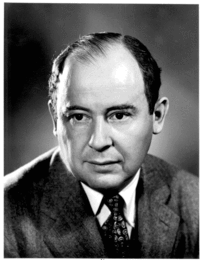Great Throughts Treasury
This site is dedicated to the memory of Dr. Alan William Smolowe who gave birth to the creation of this database.

John Von Newmann
Hungarian-American Mathematician and Polymath
"All experience shows that even smaller technological changes than those now in the cards profoundly transform political and social relationships. Experience also shows that those transformations are not a priori predictable and that most contemporary “first guesses” concerning them are wrong. For all these reasons, one should take neither present difficulties nor presently proposed reforms too seriously... To ask in advance for a complete recipe would be unreasonable. We can specify only the human qualities required: patience, flexibility, intelligence."
"I think that it is a relatively good approximation to truth — which is much too complicated to allow anything but approximations — that mathematical ideas originate in empirics. But, once they are conceived, the subject begins to live a peculiar life of its own and is ... governed by almost entirely aesthetical motivations. In other words, at a great distance from its empirical source, or after much "abstract" inbreeding, a mathematical subject is in danger of degeneration. Whenever this stage is reached the only remedy seems to me to be the rejuvenating return to the source: the reinjection of more or less directly empirical ideas."
"A large part of mathematics which becomes useful developed with absolutely no desire to be useful, and in a situation where nobody could possibly know in what area it would become useful; and there were no general indications that it ever would be so. By and large it is uniformly true in mathematics that there is a time lapse between a mathematical discovery and the moment when it is useful; and that this lapse of time can be anything from 30 to 100 years, in some cases even more; and that the whole system seems to function without any direction, without any reference to usefulness, and without any desire to do things which are useful."
"If one has really technically penetrated a subject, things that previously seemed in complete contrast, might be purely mathematical transformations of each other."
"The sciences do not try to explain, they hardly even try to interpret, they mainly make models. By a model is meant a mathematical construct which, with the addition of certain verbal interpretations describes observed phenomena. The justification of such a mathematical construct is solely and precisely that it is expected to work."
"If people do not believe that mathematics is simple, it is only because they do not realize how complicated life is."
"What is important is the gradual development of a theory, based on a careful analysis of the ... facts. ... Its first applications are necessarily to elementary problems where the result has never been in doubt and no theory is actually required. At this early stage the application serves to corroborate the theory. The next stage develops when the theory is applied to somewhat more complicated situations in which it may already lead to a certain extent beyond the obvious and familiar. Here theory and application corroborate each other mutually. Beyond lies the field of real success: genuine prediction by theory. It is well known that all mathematized sciences have gone through these successive stages of evolution. "